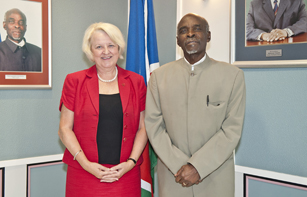
UNAIDS Deputy Executive Director, Management and Governance, Jan Beagle and the Honourable Nahas Angula, Prime Minister of the Republic of Namibia
In a meeting on 20 September with the Prime Minister of the Republic of Namibia, Honorable Nahas Angula, UNAIDS Deputy Executive Director Jan Beagle commended the Namibian government for its leadership in the HIV response and for excellent progress in responding to the national epidemic.
“Namibia has made great strides in its AIDS response. While challenges remain, it is an example for other countries in the region,” said Ms Beagle.
Gains in the national HIV response
According to government estimates, there has been a dramatic increase in the number of people accessing HIV treatment in Namibia—from less than 10 000 in 2004-05 to more than 100 000 in 2011-12. Over the past decade, the number of new HIV infections in Namibia has declined by about 60%.
Namibia has made remarkable gains in expanding access to services that prevent new HIV infections among children: By mid-2012, more than 86% of pregnant women living with HIV received services to prevent mother-to-child transmission of HIV—a threefold increase since 2005.
Ms Beagle noted that Namibia is on track to eliminate mother-to-child transmission of HIV by 2015. She commended Prime Minister Angula for his personal leadership in advocating for adequate nutrition of children in their first 1000 days of life which enhances their survival and health outcomes for the rest of their lives.
Prime Minister Angula was appointed by UN Secretary General Ban Ki Moon in April 2012 as a member of the Lead Group for ‘Scaling-up Nutrition”—a movement that brings together more than 100 organizations and governments to address hunger and under-nutrition.
Gaps in reaching young people
Despite progress, the rate of new HIV infections in Namibia—estimated at 8000 in the period 2011-12—remains unacceptably high. In 2012, over 40% of new HIV infections occurred among young people aged 15-24; young women in this age group accounted for two thirds of these infections.
While acknowledging progress in Namibia’s HIV response, Prime Minister Angula emphasized the need for his country to further strengthen HIV prevention programmes. He said Namibia should implement innovative and non-stigmatizing approaches to reach young people—especially girls—with effective programmes.
Ms Beagle concurred, noting that youth engagement in the design of such programmes is critical. “We need to involve young people in developing effective interventions that meet their needs and ensure a reduction in new HIV infections,” she said.
We need to involve young people in developing effective interventions that meet their needs and ensure a reduction in new HIV infections
UNAIDS Deputy Executive Director, Management and Governance, Jan Beagle
She urged the Prime Minister to provide Namibian youth and people living with HIV with opportunities to meet with the most senior leaders in the country to discuss their needs and challenges. Prime Minister Angula expressed his commitment to the health needs of young people and emphasized that his door is open for them.
Ms Beagle emphasized the need to expand HIV prevention programmes for young people that encapsulate elements from both the health and education sectors. She emphasized the need to integrate age appropriate and comprehensive education on sexuality and HIV in the school curriculum.
Inadequate HIV prevention in temporary settlements
During the meeting, the Prime Minister expressed concern over the lack of adequate HIV prevention programmes for populations in informal settlements. He said that such settlements are places where traditional cultural and social values that protect young people and—especially girls—have broken down, exacerbating the vulnerability of women and girls to HIV infection.
Ms Beagle agreed that the rapid expansion of informal settlements needs special attention. She said that policies need to be put in place to improve living conditions in informal settlements and to ensure that residents have access to comprehensive sexual and reproductive health (SRH) and HIV services.
Shared responsibility
Ms Beagle emphasized the importance of a Roadmap on Shared Responsibility and Global Solidarity in promoting the sustainability of AIDS responses across the continent. Adopted by the African Union in July 2012, the Roadmap is structured around three strategic pillars: health governance, diversified financing and access to medicines.
While in Namibia, Ms Beagle met the First Lady of Namibia, Madame Penehupifo Pohamba—current Chair of the Organization of First Ladies Against HIV/AIDS—and the Minister of Health, Honourable Dr. Richard N. Kamwi, Minister of Health and Social Services.
She engaged with development partners, civil society, and the UN country team and conducted a field visit to the regions in northern Namibia with a high HIV prevalence. She also spoke at the 5th African Conference on Sexual Health and Rights on the need to integrate SRH and HIV responses and launched the Namibian Youth Health Forum.




